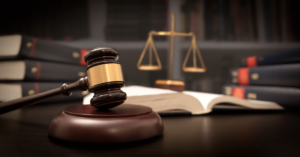INTRO: Winner of $560 million lottery is suing the New Hampshire Lottery Commission to try to protect her privacy and keep her name out of the media.
FACTS:
Woman signed the back of her lottery ticket, which allows limited release of personal information, and upon winning the $560 million she has sued in hopes of keeping her name private. The woman lives in a small town in New Hampshire and wants to retain the “freedom to walk into a grocery store or attend public events without being known or targeted.” The state is fighting the suit arguing that the rules are already in place and regardless of what the woman calls “a huge mistake,” that the rules must be followed.
ISSUES:
Plaintiff:
- right to privacy
- concern that public acknowledgement will decrease enjoyment of and participation in her community
New Hampshire Lottery Commission:
- rules in place requiring public announcement of state winners
- should’ve created a trust and their trustees would have been publicly acknowledged instead
LAW:
91-A:5-a Limited Purpose Release. – Records from non-public sessions under RSA 91-A:3, II(i) or that are exempt under RSA 91-A:5, VI may be released to local or state safety officials. Records released under this section shall be marked “limited purpose release” and shall not be redisclosed by the recipient. www.gencourt.state.nh.us/rsa/html/vi/91-a/91-a-mrg.htm
PART Sw 602 PRIZE CLAIMS
Sw 602.01 Payments.
(a) No prize shall be paid without the physical possession of a winning ticket or a valid subscription recorded in the lottery’s central computer system.
(b) Each lottery ticket, whether instant or on-line, shall be a bearer instrument until such time as a signature is placed in the designated area on the back of the ticket.
(c) When a player has a winning ticket, he/she shall complete the reverse side of the ticket with his/her name, address and signature.
(d) Prizes, not to exceed $599, shall be paid by any:
(1) Participating lottery sales agent;
(2) State liquor store; or
(3) Lottery commission headquarters.
(e) Prizes exceeding $599, shall be claimed at the lottery commission headquarters only.
(f) The claimant shall complete a winner claim form with the following:
(1) Name;
(2) Address;
(3) Telephone number;
(4) Social security number; and
(5) Claimant signature and date.
(g) The commission shall prepare a prize check and a federal W2-G, Certain Gambling Winnings, form which shall be signed by the winner. Pursuant to Internal Revenue Code Section 3402(q)(1) and the Economic Growth and Tax Relief Reconciliation Act of 2001, Sec. 101 (a), Table 7, prizes exceeding $5,000 shall be subject to applicable federal income tax withholding.
http://www.gencourt.state.nh.us/rules/state_agencies/sw600.html
Sw 602.02 Identification.
(a) At the time a claim of over $599 is made, the claimant shall furnish any of the following documentation to the commission for purposes of identification:
(1) A motor vehicle driver’s license issued by the state of New Hampshire, or a valid driver’s license issued by another state, or province of Canada, which bears the name, address and date of birth of the licensee;
(2) An identification card issued by the director of motor vehicles under the provisions of RSA 260:21, or any picture identification card issued by another state which bears the name, address and date of birth of the individual;
(3) An armed services identification card; or
(4) A valid passport from the United States or from a country with whom the United States maintains diplomatic relations.
(b) Photographic identification presented under this section shall be consistent with the appearance of the person, shall not be expired, and shall be correct and free of alteration, erasure, blemish, or other impairment.
(c) If the claimant is under the age of 16, and does not have photographic identification, the claimant shall present a valid social security card for verification by the commission.
(d) If the claimant is a trust, the individual named as trustee shall furnish photographic identification to the commission at the time of the claim. Acceptable forms of identification shall be those documents listed in Sw 602.02(a).
(e) If the claim is being filed by another individual on behalf of the claimant, the claimant’s original picture identification or a photostatic copy of the claimant’s picture identification as well as the filing individual’s original picture identification shall be presented to the commission at the time of the claim.
http://www.gencourt.state.nh.us/rules/state_agencies/sw600.html
Sw 503.01 Prize Payments. Payment of any prize shall be made to a person other than the winner as follows:
(c) To any person, including a trustee, pursuant to a certified final order of a court of competent jurisdiction approving the voluntary assignment of the right to a prize provided that the court affirmatively finds all of the following . . . .
www.gencourt.state.nh.us/rules/state_agencies/sw500.html
DETAILED FACTS:
Woman signed the back of her lottery ticket, which allows limited release of personal information, and upon winning the $560 million she has sued in hopes of keeping her name private. The woman lives in a small town in New Hampshire and wants to retain the “freedom to walk into a grocery store or attend public events without being known or targeted.” The state is fighting the suit arguing that the rules are already in place and regardless of what the woman calls “a huge mistake,” that the rules must be followed. The state urges that if a person wants to keep his/her anonymity then they should create a trust, in which case the executor signs the back of the ticket. Still the woman, who is being called Jane Doe in the law suit, states that “the limited public interest in disclosure is far outweighed by Ms. Doe’s interest in remaining anonymous.”
Steven M. Gordon, the lawyer for Jane Doe, has said that he and his team “are in conversations with the attorney general’s office,” but the attorney general’s office has not commented.
OTHER FACTS:
- In 2017, Powerball jackpot winner in Massachusetts required police surveillance at her home after media and other individuals arrived in her neighborhood looking for her. cnbc.com/2017/08/26/police-boost-patrols-around-home-of-758-point-7-million-powerball-winner.html
- In 2016, the winner of $434, 272 in the Georgia lottery was murdered when armed gunmen shot through his door and demanded money. washingtonpost.com/news/morning-mix/wp/2016/03/29/seven-charged-in-killing-of-georgia-lottery-winner-during-home-invasion/
ARTICLE LINKS:
- (Article) https://www.jdjournal.com/2018/02/06/560-million-lotto-winner-claims-she-made-huge-mistake-files-lawsuit/
- (Article) http://wtvr.com/2018/02/06/powerball-winner-files-lawsuit/
- (Article) https://www.nytimes.com/2018/02/08/us/lottery-winner-powerball-anonymous.html
- (complaint) https://www.courts.state.nh.us/caseinfo/pdf/civil/DoevNHLC/012918DoevNHLC-complaint.pdf




